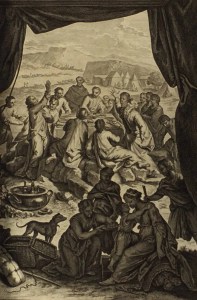Laban was the son of Bethuel and Milcah and brother to Rebecca. He was Isaac’s cousin, and later he became Isaac’s brother-in-law after Rebecca’s marriage. Laban was also the father-in-law and uncle to Jacob through marriage to Leah and Rachel. He can be found on the Bible Timeline around 1829 BC.
Quickly See 6000 Years of Bible and World History Together

Unique Circular Format – see more in less space.
Learn facts that you can’t learn just from reading the Bible
Attractive design ideal for your home, office, church …
Laban was first mentioned in the Bible after Abraham’s chief servant set off to Paddan Aram (Aram Naharaim) to do his master’s bidding of finding a suitable wife for Isaac from his own kin. After the servant’s initial meeting with Rebecca by the town’s well, she rushed back to her family and told them about a man who gave her a gold nose ring and gold bracelets. Laban played a crucial role in Isaac and Rebecca’s marriage. He acted as the head of the family as Abraham’s servant asked for Rebecca’s hand in marriage on behalf of Isaac. Laban and his father Bethuel did not consent nor decline but acknowledged that the matter “is from the Lord” (Genesis 24:50).


Laban once again became part of the story when his nephew Jacob fled his family after stealing his twin brother’s birthright. Laban gave his nephew refuge in Paddan Aram, and Jacob worked for him for seven years after meeting and falling in love with Laban’s daughter Rachel. The relationship between Laban and his son-in-law soured after a series of frauds which included the switching of brides during Rachel’s supposed wedding night, Laban’s dishonesty in the division of flocks, and changing of Jacob’s wages ten times. Jacob summed up the injustice he experienced with Laban in the passage below.
“I have been with you for twenty years now. Your sheep and goats have not miscarried, nor have I eaten rams from your flocks. I did not bring you animals torn by wild beasts; I bore the loss myself. And you demanded payment from me for whatever was stolen by day or night. This was my situation: The heat consumed me in the daytime and the cold at night, and sleep fled from my eyes. It was like this for the twenty years I was in your household. I worked for you fourteen years for your two daughters and six years for your flocks, and you changed my wages ten times. If the God of my father, the God of Abraham and the Fear of Isaac, had not been with me, you would surely have sent me away empty-handed. But God has seen my hardship and the toil of my hands, and last night he rebuked you.” Genesis 31:38-43 NIV
Both, later on, agreed on a covenant and parted on good terms.
Picture By illustrators of the 1728 Figures de la Bible, Gerard Hoet (1648-1733) and others, published by P. de Hondt in The Hague in 1728 – http://www.mythfolklore.net/lahaye/032/LaHaye1728Figures032GenXXXI44-54JacobLabanMakeCovenant.jpg, Public Domain, https://commons.wikimedia.org/w/index.php?curid=8479622
There is a lack of Scripture references to “prove” that Laban is related to Bethuel and Milcah. Am I supposed to look them up myself? That’s why I clicked on this “hit” in Google.
The only way to “prove” this is to take Genesis 29:5 as Laban is the grandson of Nahor (the text says, “son”), and compare Gen 24:29 (Laban and Rebekah are siblings) with Gen 24:48 which says Rebekah is Abraham’s brother’s daughter. We already know she is Abe’s brother’s grand daughter from 24:24. A grandson, great grandson, etc; and even a son-in-law will be called a “son” in scripture in many places. (Matthew 1:1, Numbers 16:1, 8, Ruth 4:17, 2 Samuel 9:6, 1 Samuel 24:16)